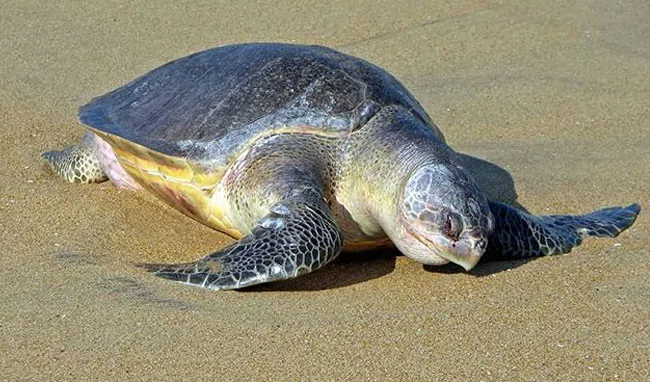"Dream, Dream, Dream! Conduct these dreams into thoughts, and then transform them into action."
- Dr. A. P. J. Abdul Kalam
"Dream, Dream, Dream! Conduct these dreams into thoughts, and then transform them into action."
- Dr. A. P. J. Abdul Kalam
11 Sep 2024
In a heartening victory for both local communities and conservationists, Kasarkod Tonka in Honnavar taluk has been officially marked on Google Maps as a critical nesting site for the endangered Olive Ridley turtles. The identification of the "Olive Ridley Turtle Road" by Google brings renewed hope for the future protection and preservation of this crucial area, particularly as it has been at the center of a legal dispute for years.
For five years, this 1.4 km-long mud road, which connects the coastal settlement to a proposed private port, has been the subject of intense debate. A private port company had petitioned the courts to declare the road a port route and sought permission to widen it into a four-lane, asphalt road. The expansion would have drastically altered the surrounding environment, threatening the fragile nesting grounds of the Olive Ridley turtles, a species listed as critically endangered under India's Wildlife Protection Act of 1972.
However, local fishermen and environmental activists have staunchly opposed this plan, emphasizing the importance of this location as one of the state's most significant Olive Ridley nesting sites. Every year, between December and April, female Olive Ridley turtles make their way to the shores of Kasarkod Tonka to lay their eggs. The beaches here have become a hub for both scientists and conservationists, who closely monitor the nesting activity. Their research and observations have been instrumental in highlighting the ecological importance of the region.
A particularly interesting development in the fight to protect the turtles came with Google's decision to recognize the area as a conservation site. Marine biologist and activist Prakash Mesta believes that Google’s mapping of the "Olive Ridley Turtle Road" and its surrounding beach area as a conservation zone is the result of years of meticulous documentation. "Over the past couple of years, visitors and scientists have come here to study the nesting patterns and have tagged the area as a nesting site. This consistent tagging and public interest may have led to Google recognizing this place as a conservation area," said Mesta.
This recognition could have long-term benefits for the protection of the turtles. By marking it on the world's most popular mapping platform, more people—especially those searching for information on Olive Ridley turtles—are now directed to this site. It not only increases awareness of the need to conserve the area but also strengthens the local argument against industrial expansion that could jeopardize the turtles' habitat.

The Olive Ridley sea turtle, one of the smallest of all sea turtles, is best known for its synchronized mass nesting behavior known as *arribada*. During an *arribada*, thousands of females come ashore simultaneously to lay eggs, often in the same place where they were born. While the species is found in various tropical and subtropical waters around the world, its population has significantly declined over the past few decades, largely due to human activities, habitat loss, and illegal poaching. Therefore, protecting nesting sites like Kasarkod Tonka is crucial for ensuring their survival.
The decision to conserve this beach could serve as a model for similar efforts along India's vast coastline. The collaboration between local activists, scientists, and global platforms like Google could inspire other regions to adopt similar strategies for wildlife protection.
For the residents of Kasarkod Tonka, this recognition has brought a sense of pride and optimism. They hope that the newfound attention will lead to even greater efforts to safeguard the turtles and their habitats in the years to come. The road ahead may still be long, as the legal battle over the port road continues, but with growing awareness and the backing of global platforms, the odds may be shifting in favor of conservation.
As the world becomes more attuned to the need for environmental sustainability, stories like that of the Olive Ridley turtles in Honnavar remind us of the power of grassroots activism and modern technology to protect our planet’s most vulnerable species.